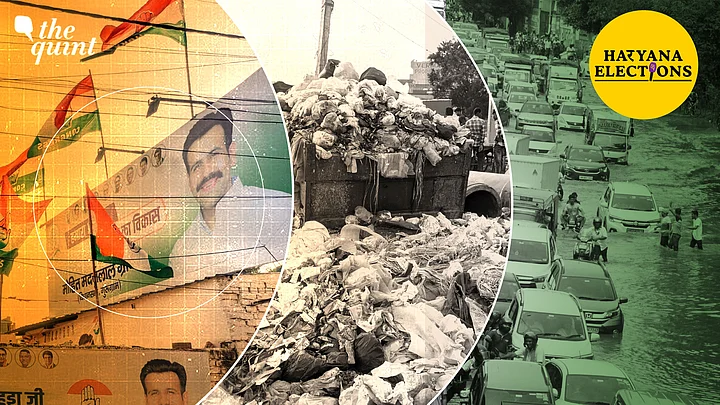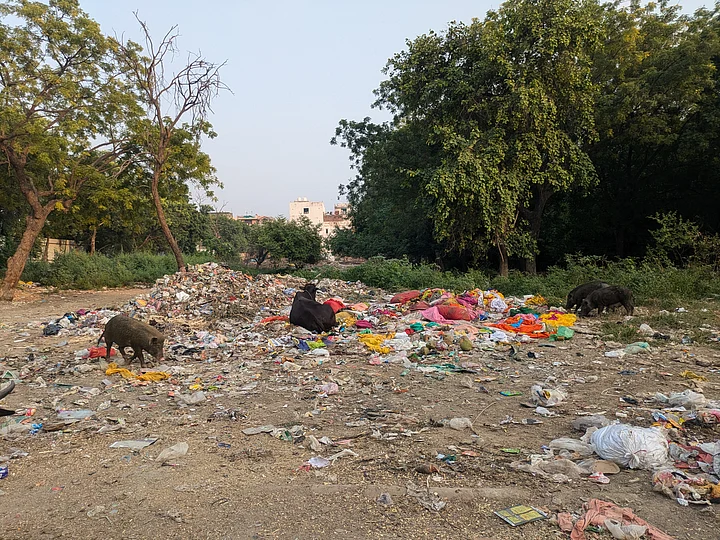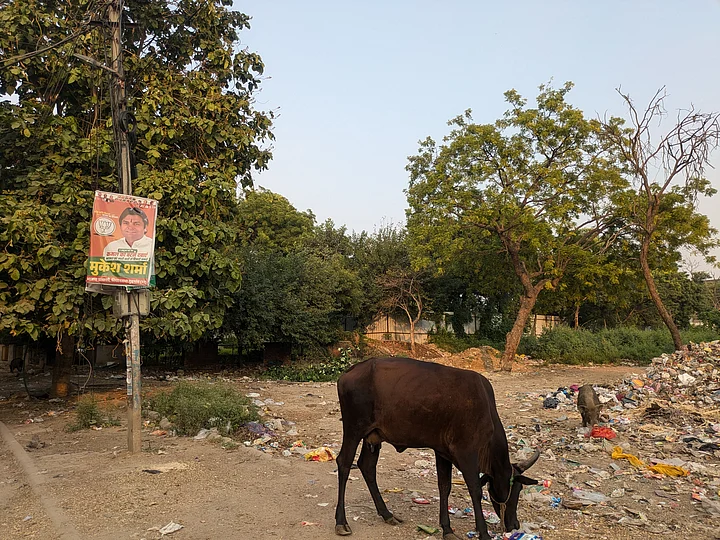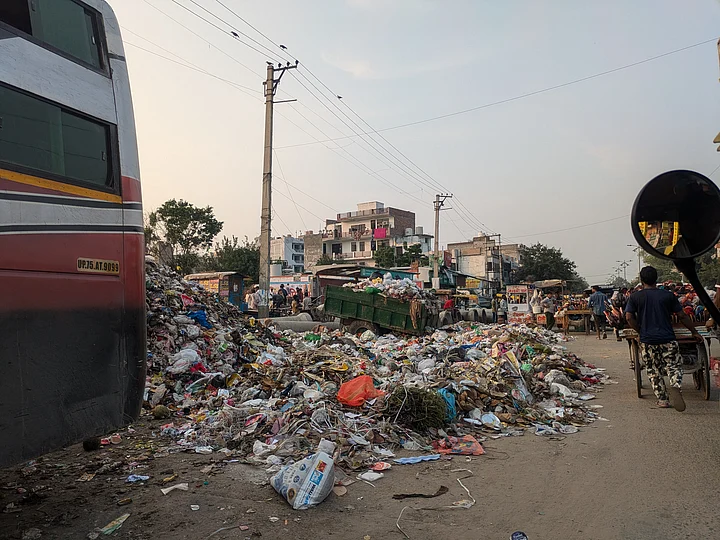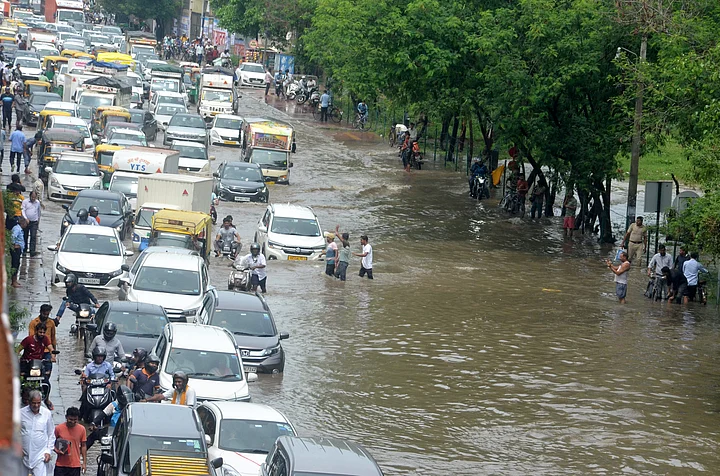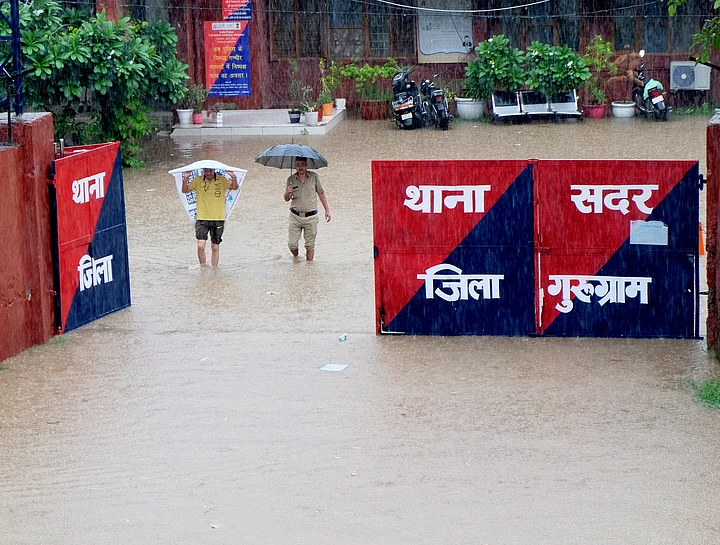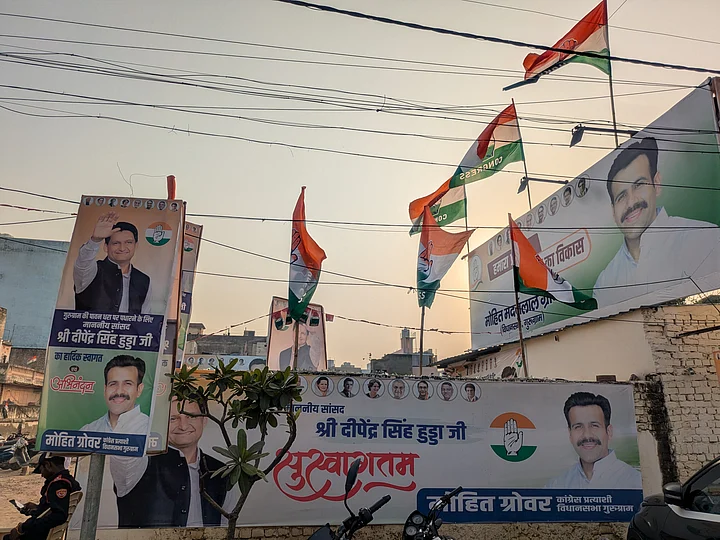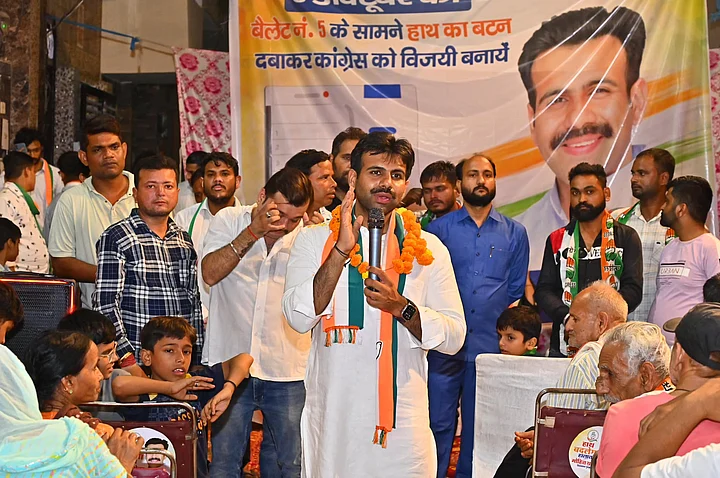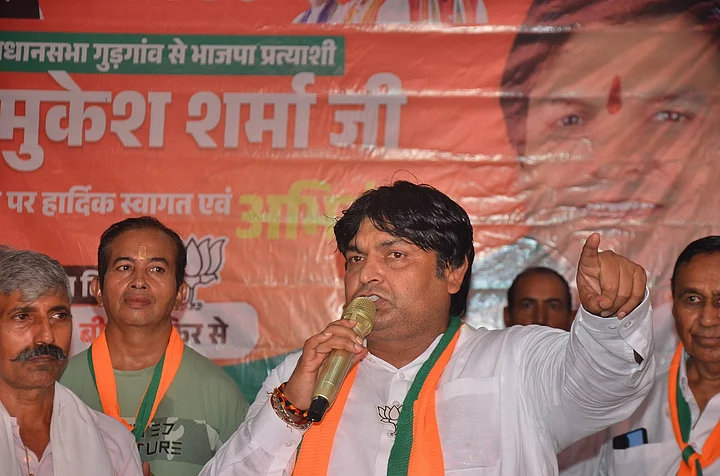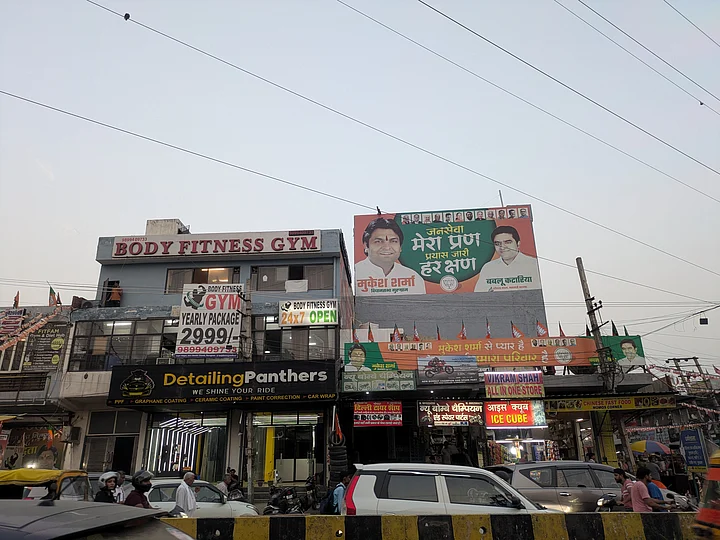“Ek taraf mehengai ne kamar tod di hai, to dusri taraf jaati aur dharm ne gareebi ki oar dhakel diya hai,” said Baijnath Ram, who drives an auto rickshaw in Sector 12 of Gurugram.
Belonging to the Dalit community, Baijnath has been residing with his wife and son in Sheetla Colony in old Gurgaon for the last 20 years. “Ye sarkaar Dalit samaj ko nahi puchti,” he complained as he pointed at mounts of squalor flanking what could barely be described as a road.
As Haryana readies for Assembly elections due on 5 October, the BJP and Congress are increasingly wrangling over issues ailing the state including unemployment, corruption, infrastructure, and violence against minorities.
On 28 September, while addressing a rally in Hisar, Prime Minister Narendra Modi accused the Congress of being ‘anti-Dalit', saying the party “kept silent quiet when Dalits faced atrocities.”
Responding to this, Congress’ candidate from Gurgaon constituency Mohit Grover told The Quint during an interview that the BJP is a party adept at only “giving out slogans and taunts.”
“Haryana has had a BJP government for the last ten years. Gurugram has had a BJP MP and MLA for the last ten years and look at the condition of this city. There is garbage everywhere. Infrastructure is crumbling. Is this what you call a Millenium City?” Grover remarked.
The Quint went on ground to Gurugram to speak to residents, voters and party workers to identify the issues pervading the city and get a sense of which political party has the edge this time around.
‘Waterlogging Cripples Millennium City’
“Naam badalne se haalat nahi badal jaati,” said a shop-owner at old Gurgaon’s Sadar Bazaar, requesting anonymity.
In April 2016, the Manohar Lal Khattar-led BJP government in Haryana had announced the decision to rename Gurgaon to Gurugram to assert the city’s mention in Bhagwat Gita as a great centre of learning.
In the 90’s and early 2000s, after it witnessed rapid urbanisation, Gurgaon earned the epithet of ‘Millenium City’ and is a hub of corporates, multinational companies, the Information &Technology (IT) sector and even luxury housing.
But recent reports about Gurugram’s infrastructure pose a grave threat to its moniker.
“Excessive waterlogging on roads cripples the city almost each time it rains. Even ultra luxurious, expensive areas face water-logging issues,” said Kuldeep, a businessman who lives in Gurgaon.
In July, a resident had put up a purported video showing his luxury cars soaked in dirty water, which had flooded the roads in Sector 57 of Gurugram after a brief spell of rain:
Meanwhile, 19-year-old Aman, who sets up a temporary clothes shop at Arjun Market in DLF Phase 1 of Gurgaon, complained that he has only one pair of shoes.
“Every time it rains, the roads get full of mud and dirty water. I walk 2.5 km to work and back and my shoes get wet and dirty. Neither can I afford to take a rickshaw nor buy new shoes,” Aman said.
Congress Points Out Connectivity Woes, BJP Promises to Fix Them
There’s an unsettling contrast between old and new Gurugram, with the former still years away from being the Millennium City. The swanky high-rises often obscure the older part of the city, not only from public view but also from government’s outreach. The chasm is deepened by the apparent lack of connectivity between the two areas.
“It takes 40 to 45 minutes to commute from old to new Gurgaon— a distance of 2-3 km—in a car. Metro connectivity is only on paper. The progress of metro construction has not moved since the last ten years, when the Congress had left it. The BJP has not added a single new pillar. There is no affordable transport that connects old to new Gurgaon,” Grover claimed.
In response to this, BJP in-charge for Gurgaon Vidhan Sabha elections Prof Sanjay Bhasin told The Quint that a new metro line—which will connect IFFCO Chowk to Gurgaon Railway Station via Subhash Chowk—has been announced and work will start on it shortly after elections. Besides, AC buses and roadways buses are in operation, he said.
The Haryana Mass Rapid Transport Corporation (HMRTC) had reportedly approved these projects on 19 August, weeks ahead of elections.
While campaigning for BJP’s Gurgaon candidate Mukesh Sharma on 25 September, Union Minister of Road Transport & Highways Nitin Gadkari said that he was “aware of commuters’ woes” and declared that “Haryana’s national highways infrastructure will be better than the US by the end of 2024.”
Bhasin added that the party has taken cognizance of waterlogging and traffic jam issues and promises to fix it by expediting construction and repair work.
Poor Civic Amenities, High Prices: Migrant Workers’ Woes
Gurgaon has a significant migrant population — 59.4 percent according to a research paper published by International Institute of Population Studies, Mumbai in 2021. These include people who moved from neighbouring Delhi, Punjab and Uttar Pradesh for work or those who moved with their families.
“Compared to other metropolitan areas, in Gurgaon, you can get ample space for your money...Locals usually don’t bother migrants because they recognise that it’s the migrants who have contributed to Gurgaon’s growth,” said Suyash, 29, a media professional who had moved to the city from Mumbai five years back.
Bharat, who works with a SaaS company and had moved to Gurgaon from Bangalore two years ago, complained about the high cost of living here, “especially when put in context with the civic amenities we get—roads full of potholes, waterlogging and garbage dumped everywhere.”
Despite these issues, most migrant working professionals residing in Gurgaon can’t affect any change through voting and will have to rely on the natives’ verdict.
“65 percent of Haryana’s revenue comes from Gurgaon and yet the administration can’t provide basic amenities. On the ground, issues such as poor roads, sewage disposal, electricity and water persist,” Grover claimed.
In July, the Gurugram Metropolitan Development Authority (GMDA) reportedly approved a budget of over Rs 2,800 crore for various infrastructure projects in the city.
Who Has the Edge in Gurgaon—Congress or BJP?
Gurgaon is set to see a tough contest that seems largely bipolar—between the Congress and BJP. Other candidates include Gaurav Bhat from Indian National Lok Dal (INLD), Ashok Jangra from Dushyant Chautala’s Jannayak Janta Party (JJP) and eight Independents.
In the 2019 Haryana Vidhan Sabha election, Grover had contested as an Independent and polled nearly 49,000 votes. But this time, the 31-year-old Congress candidate is confident of winning from Gurgaon.
“The Congress will win around 70 of the total 90 Assembly seats in Haryana. And we are winning Gurgaon for sure. We have the support of all communities and religions,” Grover told The Quint. He said his father Madan Lal Grover has been associated with the Congress for 30 years and described Deepender Singh Hooda as an “elder brother” and “guiding light”.
But Bhasin said that Grover was given the ticket by Congress because he belonged to the Punjabi community, purportedly the dominant one among Gurgaon natives.
“But the BJP doesn’t think like this. We picked Sharma because he has a good connection with the masses and he works hard. We believe all of the 36 biradri support us and the BJP will form the government for the third time. Gurgaon has always been a BJP seat,” Bhasin told The Quint.
Sharma used to be a wrestler until his political plunge in 2003. He is also the national coordinator of BJP’s sports cell.
During the 2019 and 2014 Vidhan Sabha elections, Gurgaon was won by the BJP. Although, during the 2024 Lok Sabha polls, the BJP lost half of its ten seats to the Congress, the party managed to retain the Gurgaon parliamentary constituency, which comprises of three Assembly segments—Badshahpur, Sohna and Pataudi.
“This government is not for poor. It works only for big industrialists. We want change,” said Baijnath.
The results of Haryana elections will be declared on 8 October.
(At The Quint, we question everything. Play an active role in shaping our journalism by becoming a member today.)
